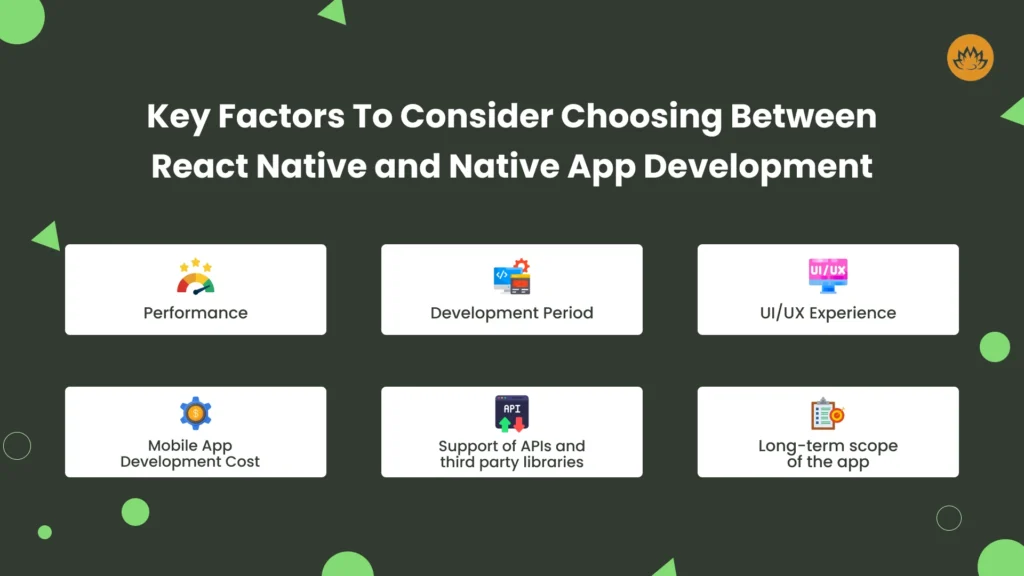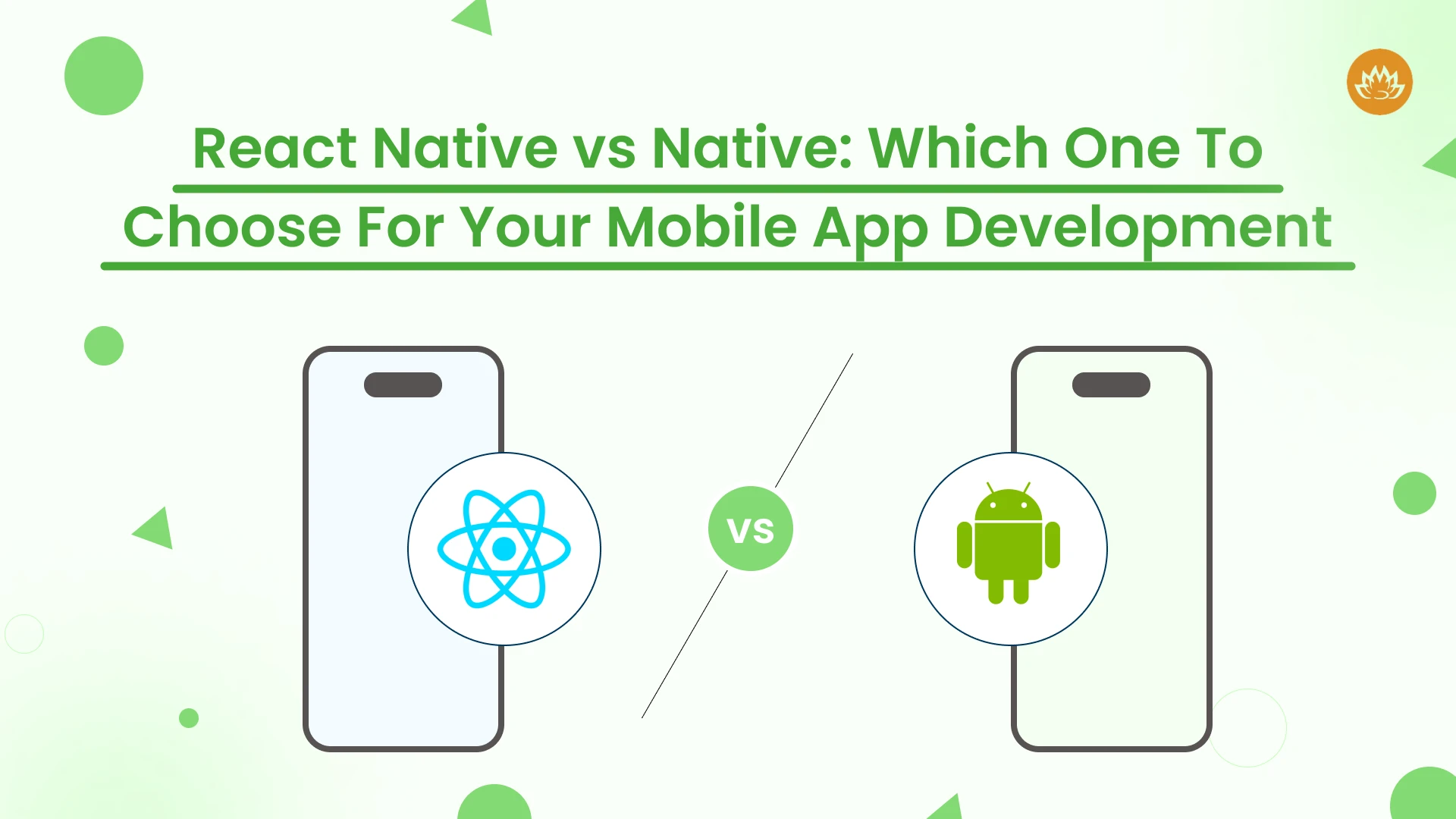Many frameworks, programming languages, and software development tools are used to develop mobile applications. Often, we need clarification regarding their core functionalities and features. One such example is the confusion prevailing between React Native and Native. Exceptional cases are those who admire the Native application development approach and who have turned towards React Native, a cross-platform framework for various reasons.
Well, if you are someone who still cannot decide which of the above two options is the best for your mobile app development project, read on further. The blog delves deeper into different factors that you must consider before deciding the best mobile app development approach for your project. It is not which one is the best from React Native and Native. It is all about knowing which one is most suitable as per your requirements.
What is React Native?
React Native is a JavaScript-based technology created and maintained by Facebook. It is a cross-platform framework used by React developers to develop mobile applications with a shared codebase between multiple platforms. Building cross-platform mobile applications with React Native is a unique experience as compared to using technologies like PhoneGap, Cordova, Flutter, etc. React Native uses JavaScript for rendering native components. It omits all the drawbacks of web page loading into a mobile application.
Pros of React Native App Development
- Helps developers build cross-platform mobile applications with native-like user experiences.
- Provides equally high performance and customized look and feel like native apps.
- Can build apps on different platforms through a single codebase.
- Feasible enough to add platform-specific features that are not supported by React Native, by writing a native module for that functionality and integrating it into a React Native enabled app.
- Supports over-the-air updates, helping users have a seamless experience even in between the iterations. Further, it helps update apps without asking users.
- Through JavaScript, you can use Node.js in the backend and React in the front end, helping developers manage various actions. A single team can work simultaneously for two applications on different platforms.
- With React Native, you can release your apps faster than native apps. In addition, you can do that for two different platforms.
Cons of React Native Development
- It does not work for resource-heavy applications as it hampers seamless interactions within the internal device’s hardware.
- Native developers get access to the latest features released on iOS and Google platforms. Whereas React developers take more time to implement those features into their React Native app.
What is Native App Development?
Native App Development is about developing different applications for different platforms by using various native technologies. Objective-C and Swift are used for iOS app development and Java and Kotlin are used for Google Android mobile app development. You can run native applications only on those operational systems for which is created. For instance, if your target audience exists on two platforms such as iOS and Android, be prepared to develop two different mobile applications for both.
Pros of Native App Development
- They have full access to devices for handling data-heavy functionalities like VR, AR, animations, and computations.
- Native developers get instant access to Apple’s new versions of operating systems including features and functionalities
- Easier for developers to integrate native language with implemented software and hardware solutions.
- Developers get easy access to devices like SDKs, sensors, or various such functionalities.
Cons of Native App Development
- For developing two different applications, you will need different technologies, and hire experienced developers, increasing your overall development cost.
- After launching your app, you need a set of team on your feet to fix bugs or any technical issues. You need at least two developers for each platform.
- Not suitable for companies that want rapid app release for multiple platforms.
- Startups with limited budgets and resources can face a severe problem by adopting native app development. Just a blind guess can hamper the upcoming opportunities.
- For simple and less complex apps like a Grocery app or Personal care app, you need a cross-platform framework. Native app development can create success mostly for complex applications.
Key Factors You Must Consider Before Finalizing Between React Native and Native App Development

Development Period
For Native apps, the codes are written separately for two different platforms. Hence it takes more time, effort, and double the size of the team to make your app available on both platforms. In addition, whenever there are any changes in the operating systems, you need to run the entire project again.
In the case of React Native, all you need is a single code that is written for both platforms by the same team of developers. Moreover, the hot reload feature makes it very easy to deploy the project simultaneously on both platforms. Since there is no rebuilding process, it saves an ample amount of time and effort.
Mobile App Development cost
Developing apps with React Native can reduce the cost by up to 30% as compared to apps built with Native app development. Mobile app development cost is one of the major factors responsible for developing robust mobile apps.
UI/UX Experience
React Native provides reusable components such as functionality code and platform-specific code to create complex user interfaces. However, developers find it difficult to create custom views, seamless transitions, navigation patterns, and animations with React Native. Even the UI/UX standards differ in both platforms of Android and iOS.
This is not the case for Native application development as developers design every screen individually for different platforms, giving better UI/UX experiences.
Scalability
React Native provides developers with a wider set of opportunities for accomplishing more amount of work and for releasing high-functioning updates. Hence, React Native is highly scalable as compared to Native.
Performance
Backed by JavaScript technology, React Native cannot perform multiple asynchronous tasks simultaneously. Also, the framework is unsupportive towards trending modules and features, embracing native device features and performing complex manipulations becomes challenging.
Technologies like Swift, Kotlin, and Java create Native apps. All these technologies are much faster and more efficient than JavaScript. They can execute heavy calculations and can integrate the most advanced hardware devices.
Long-Term Scope of the App
Google and Apple give more priority to native platforms. Hence, native apps can be accessed easily to resolve errors and launch updates without hampering usability.
On the other hand, React Native cannot keep updates like Native. It becomes difficult to launch or build updates
Programming Language
Programming languages like Kotlin, Java, and Swift are easy to learn and execute as they have proper documentation to develop Native apps.
Even JavaScript is easier to learn for creating React Native apps. However, it has flaws and loopholes like poor documentation, and challenges React Native developers to get proper clarity of the process. In addition, you cannot sync the tools and updates so easily in the future. With no guarantee of continuity of support, React Native once again is not a better choice for long-term applications.
Native Apps Interactivity
Native apps can easily interact with other native apps. They can even access data to offer exceptional experiences. This is not possible in React Native as the apps rely on third-party libraries for communication with other apps.
Support of APIs and Third Party Libraries
Native app development frameworks can use all kinds of APIs and third-party libraries directly. On the other hand, React native apps can get access to only chosen APIs during the development process. To integrate complex APIs, you can use Native technologies to connect a layer.
App Security
JavaScript is not a secured typed programming language. As the React Native framework is built through JavaScript, it creates a few technical challenges as compared to Native app development languages like Swift and Kotlin. Moreover, the third-party libraries used by React Native hamper error and loophole identification during the development stage. Hence, React Native is less secure than Native app development technologies.
Native Module Support
React Native easily deals with cross-platform cases. However, it does not have sufficient APIs to contain all native-like mobile features. It needs native module support if in any case API access is required. This comes down to the fact that any React app development company must have code mastery in both native languages.
In the case of a Native mobile app for both platforms, there is no such constraint in the development stage.
When to Choose React Native Mobile App Development
Choose React Native Mobile app development in the following scenarios:
- To build simple apps
- To launch cross-platform apps
- To develop apps within a restricted budget
- To grab maximum market quickly
- For creating a social media app
- To develop an e-commerce app
Why React Native is a Better Choice for Startups
- Helps target a larger group of audience on multiple platforms
- Can create similar apps for different platforms only through a single team.
- Reduces costs and works for startups having limited budgets
- Helps launch a mobile app on multiple platforms simultaneously
Top Brands Working with React Native

- Facebook
- Walmart
- SoundCloud
- Bloomberg
- Wix
Final Thoughts
To conclude, it all depends on the kind of project you are working on. React Native is exceptionally the best choice for startups as they need to cover massive audiences at a faster pace. They would not want to waste resources on developing separate native apps. React Native app development has walked miles to become so popular. Today it is used by several tech giants. However, every company has its own set of needs and challenges. Native app development is suitable for complex projects and needs more investment of time, effort, and money.
Whitelotus Corporation is an eminent React app development company. We have the best React Native developers who work diligently on multiple projects and can deliver phenomenal results that will meet your business requirements. Feel free to contact us and talk with us to know how we can help you get more conversions. We enable technologies to become business tools focusing more on user needs and help you evolve your product with informed decisions.
FAQs
1. Which is better Native or React Native?
React Native app development is better when you are running a startup that targets all kinds of audiences, has a limited budget, and is unsure of the kind platform that suits best for their product.
2. Which is slower, a React Native app or a Native app?
Both have an equal amount of efficiency. However, they differ in terms of scalability. React Native is more scalable.
3. Is React Native hybrid or Native?
React native none of them. It is a cross-platform framework, developing applications that run on multiple platforms.
Author

Sunil is a result-orientated Chief Technology Officer with over a decade of deep technical experience delivering solutions to startups, entrepreneurs, and enterprises across the globe. Have led large-scale projects in mobile and web applications using technologies such as React Native, Flutter, Laravel, MEAN and MERN stack development.
View all posts











